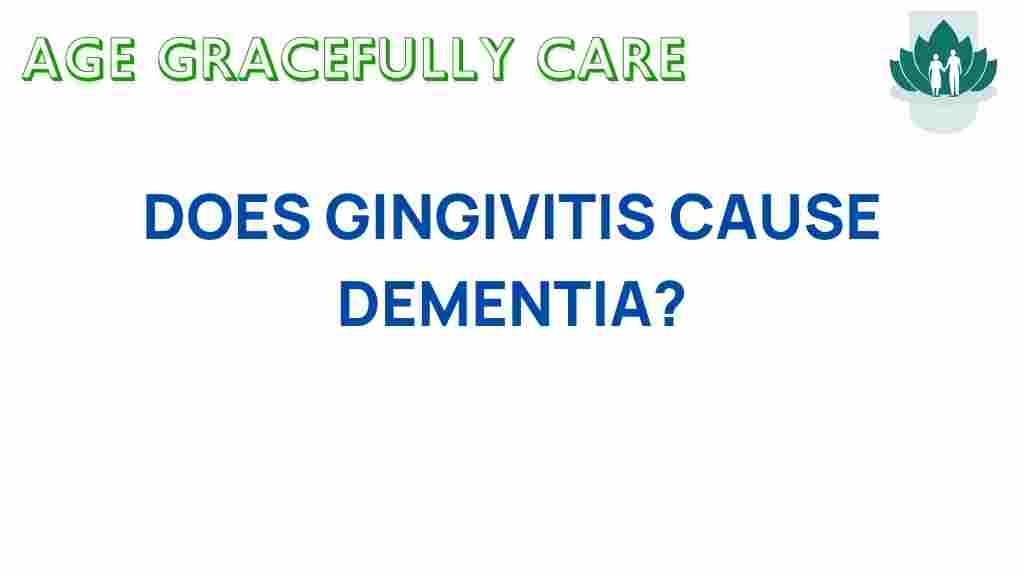The Surprising Link Between Gingivitis and Dementia
Oral health is often overlooked in discussions about overall well-being, yet it plays a crucial role in numerous health outcomes. Recent research has revealed a surprising connection between gingivitis, a common form of periodontal disease, and dementia, particularly in the context of cognitive decline and brain health. Understanding this link can help us identify risk factors associated with both conditions and potentially lead to preventive measures.
Understanding Gingivitis and Its Impact on Oral Health
Gingivitis is an inflammatory condition of the gums characterized by redness, swelling, and bleeding. It is typically caused by the buildup of plaque—a sticky film of bacteria—on the teeth. If left untreated, gingivitis can progress to more severe forms of periodontal disease, which can result in tooth loss and significant oral health issues.
Key symptoms of gingivitis include:
- Red or swollen gums
- Bleeding while brushing or flossing
- Bad breath
- Receding gums
Maintaining good oral hygiene is essential to prevent gingivitis. This includes regular brushing, flossing, and dental check-ups. However, the implications of gingivitis extend beyond oral health, affecting other areas of the body, including the brain.
The Connection Between Gingivitis and Dementia
Recent studies have begun to explore the intricate relationship between gingivitis and dementia, particularly Alzheimer’s disease. Research indicates that chronic inflammation associated with gingivitis may contribute to cognitive decline.
Here are some ways gingivitis might be linked to dementia:
- Inflammation: Chronic inflammation is a common theme in both gingivitis and neurodegenerative diseases. Inflammation in the gums can lead to systemic inflammation, which may affect brain health.
- Bacterial Pathways: The bacteria responsible for gingivitis may enter the bloodstream and travel to the brain, potentially leading to neuroinflammation and contributing to Alzheimer’s pathology.
- Immune Response: The immune response triggered by periodontal disease may play a role in cognitive decline. An overactive immune response can lead to damage in brain tissues.
Research Findings on Gingivitis and Cognitive Decline
Several studies have found a correlation between poor oral health and increased risk of cognitive decline:
- A study published in the Journal of Alzheimer’s Disease found that patients with periodontal disease had a higher risk of developing Alzheimer’s.
- Research from the American Journal of Alzheimer’s Disease & Other Dementias indicated that individuals with higher levels of gum disease were more likely to experience memory problems.
These findings suggest that maintaining good oral health could be a vital factor in reducing the risk of dementia.
Steps to Improve Oral Health and Potentially Reduce Dementia Risk
To combat gingivitis and its potential link to dementia, consider implementing the following steps:
1. Maintain a Rigorous Oral Hygiene Routine
Brush your teeth at least twice a day with fluoride toothpaste and floss daily. Consider using an antibacterial mouthwash to reduce plaque buildup.
2. Schedule Regular Dental Check-ups
Visit your dentist every six months for cleanings and check-ups. Professional cleanings can help remove plaque and tartar that regular brushing might miss.
3. Adopt a Healthy Diet
A diet rich in fruits, vegetables, whole grains, and lean proteins can support oral health. Avoid sugary snacks and beverages that promote plaque formation.
4. Quit Smoking
If you smoke, quitting can significantly improve your oral health and reduce your risk of periodontal disease.
5. Manage Chronic Conditions
Conditions such as diabetes and heart disease can exacerbate gum disease. Managing these conditions with the help of your healthcare provider is crucial.
Troubleshooting Common Oral Health Issues
If you experience symptoms of gingivitis or are concerned about your oral health, consider the following troubleshooting tips:
- Persistent Bleeding: If your gums bleed regularly while brushing or flossing, consult your dentist. This could be a sign of gingivitis or more advanced periodontal disease.
- Bad Breath: Chronic bad breath (halitosis) can indicate gum disease. Maintain oral hygiene and seek professional advice if it persists.
- Receding Gums: If you notice your gums pulling away from your teeth, it’s important to see a dentist. This can lead to tooth loss if untreated.
The Role of Inflammation in Oral Health and Brain Health
Inflammation plays a central role in both gingivitis and cognitive decline. When gums are inflamed, the body’s immune response can create an environment that affects overall health. This systemic inflammation can potentially harm brain health, leading to cognitive decline and increasing the risk of diseases like Alzheimer’s.
To combat inflammation, consider the following:
- Healthy Fats: Incorporate omega-3 fatty acids found in fish, flaxseeds, and walnuts to help reduce inflammation.
- Antioxidant-Rich Foods: Foods high in antioxidants, such as berries and green leafy vegetables, can help combat oxidative stress in the body.
- Regular Exercise: Physical activity is known to reduce inflammation and improve overall health.
Conclusion: Prioritizing Oral Health for Better Brain Health
The surprising link between gingivitis and dementia highlights the importance of oral health in maintaining overall well-being. By understanding the connection between inflammation, periodontal disease, and cognitive decline, individuals can take proactive steps to protect their brain health.
Improving oral hygiene, managing inflammation, and addressing other risk factors can play a crucial role in reducing the risk of dementia. As research continues to explore this connection, prioritizing oral health should be a significant part of a holistic approach to health and wellness.
For more information on maintaining oral health and its impact on overall health, consider visiting the Mayo Clinic website.
Remember, taking care of your teeth and gums is not just about a beautiful smile; it’s also about safeguarding your brain health for the future.
This article is in the category Health and created by AgeGracefullyCare Team
